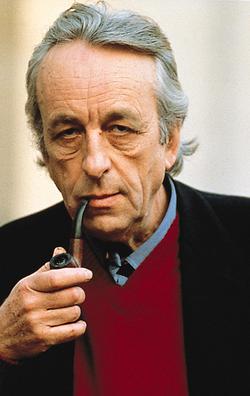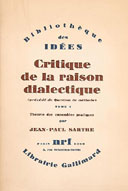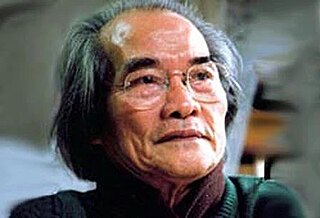
Maurice Jean Jacques Merleau-Ponty was a French phenomenological philosopher, strongly influenced by Edmund Husserl and Martin Heidegger. The constitution of meaning in human experience was his main interest and he wrote on perception, art, politics, religion, biology, psychology, psychoanalysis, language, nature, and history. He was the lead editor of Les Temps modernes, the leftist magazine he established with Jean-Paul Sartre and Simone de Beauvoir in 1945.

Louis Pierre Althusser was a French Marxist philosopher who studied at the École normale supérieure in Paris, where he eventually became Professor of Philosophy.

Critique of Dialectical Reason is a 1960 book by the philosopher Jean-Paul Sartre, in which the author further develops the existentialist Marxism he first expounded in his essay Search for a Method (1957). Critique of Dialectical Reason and Search for a Method were written as a common manuscript, with Sartre intending the former to logically precede the latter. Critique of Dialectical Reason was Sartre's second large-scale philosophical treatise, Being and Nothingness (1943) having been the first. The book has been seen by some as an abandonment of Sartre's original existentialism, while others have seen it as a continuation and elaboration of his earlier work. It was translated into English by Alan Sheridan-Smith.

Reading Capital is a 1965 book about the philosopher Karl Marx's Das Kapital by the philosophers Louis Althusser, Étienne Balibar, and Jacques Rancière, the sociologist Roger Establet, and the critic Pierre Macherey. The book was first published in France by François Maspero. An abridged English translation was published in 1970, and an unabridged translation in 2015. The book was influential among intellectuals.

Alexandre Kojève was a Russian-born French philosopher and statesman whose philosophical seminars had an immense influence on 20th-century French philosophy, particularly via his integration of Hegelian concepts into twentieth-century continental philosophy. As a statesman in the French government, he was instrumental in the formation of the European Union.

Phenomenology of Perception is a 1945 book about perception by the French philosopher Maurice Merleau-Ponty, in which the author expounds his thesis of "the primacy of perception". The work established Merleau-Ponty as the pre-eminent philosopher of the body, and is considered a major statement of French existentialism.

Trần Đức Thảo was a Vietnamese philosopher. His work attempted to unite phenomenology with Marxist philosophy. His work had some currency in France in the 1950s and 1960s, and was cited favorably by Jacques Derrida, Jean-François Lyotard and Louis Althusser.
Warren Montag is a professor of English at Occidental College in Los Angeles, California. He is known primarily for his work on twentieth-century French theory, especially Althusser and his circle, as well as his studies of the philosophers Spinoza, Locke, and Hobbes.
20th-century French philosophy is a strand of contemporary philosophy generally associated with post-World War II French thinkers, although it is directly influenced by previous philosophical movements.
John Russon is a Canadian philosopher, working primarily in the tradition of Continental Philosophy. In 2006, he was named Presidential Distinguished Professor at the University of Guelph, and in 2011 he was the Shastri Indo-Canadian Institute's Canadian Lecturer to India.
This is a list of articles in continental philosophy.

For Marx is a 1965 book by the philosopher Louis Althusser, a leading theoretician of the French Communist Party (PCF), in which the author reinterprets the work of the philosopher Karl Marx, proposing an epistemological break between the young, Hegelian Marx, and the old Marx, the author of Das Kapital (1867–1883). The book, first published in France by François Maspero, established Althusser's reputation. The texts presented in For Marx are theoretical interventions in a definite conjuncture, particularly aiming at the definition of the lines to be pursued by the PCF after Stalin's years in the Soviet Union. Althusser's position is of theoretical antihumanism, and is against the teleology of history. Althusser defends that history is a process without subject and with an open end, but that has determinations that can be theorized by the science of history as constructed by Marx in his mature work, Das Kapital. Society is then conceptualized as a complex whole articulated in dominance by the economy where several social practices co-exist with a relative autonomy, introducing the concept overdetermination to characterize the levels of effectivity.
Fred Evans is an American philosopher. He is a Professor of philosophy at Duquesne University and Director of the Center for Interpretative and Qualitative Research. His research and teaching interests are in contemporary continental philosophy, social and political philosophy, and philosophy of language, psychology and technology.
Chiasmi International: Trilingual Studies Concerning the Thought of Merleau-Ponty is a peer-reviewed academic journal that publishes articles, reviews, and discussions in Italian, French, and English on the thought of the French philosopher Maurice Merleau-Ponty. The journal is produced in cooperation with the Italian Società di Studi su Maurice Merleau-Ponty, and is distributed by Mimesis Edizioni in Italy , Librairie philosophique J. Vrin in France, and Pennsylvania State University in the United States. All issues are available online from the Philosophy Documentation Center. The journal is abstracted and indexed in The Philosopher's Index, PhilPapers, and the Philosophy Research Index.
Marxist humanism is an international body of thought and political action rooted in a humanist interpretation of the works of Karl Marx. It is an investigation into "what human nature consists of and what sort of society would be most conducive to human thriving" from a critical perspective rooted in Marxist philosophy. Marxist humanists argue that Marx himself was concerned with investigating similar questions.
John Lewis was a British Unitarian minister and Marxist philosopher and author of many works on philosophy, anthropology, and religion.
Neo-Marxism is a collection of Marxist schools of thought originating from 20th-century approaches to amend or extend Marxism and Marxist theory, typically by incorporating elements from other intellectual traditions such as critical theory, psychoanalysis, or existentialism. Neo-Marxism comes under the broader framework of the New Left. In a sociological sense, neo-Marxism adds Max Weber's broader understanding of social inequality, such as status and power, to Marxist philosophy.
Marxist philosophy or Marxist theory are works in philosophy that are strongly influenced by Karl Marx's materialist approach to theory, or works written by Marxists. Marxist philosophy may be broadly divided into Western Marxism, which drew from various sources, and the official philosophy in the Soviet Union, which enforced a rigid reading of what Marx called dialectical materialism, in particular during the 1930s. Marxist philosophy is not a strictly defined sub-field of philosophy, because the diverse influence of Marxist theory has extended into fields as varied as aesthetics, ethics, ontology, epistemology, social philosophy, political philosophy, the philosophy of science, and the philosophy of history. The key characteristics of Marxism in philosophy are its materialism and its commitment to political practice as the end goal of all thought. The theory is also about the struggles of the proletariat and their reprimand of the bourgeoisie.
Western Marxism is a current of Marxist theory that arose from Western and Central Europe in the aftermath of the 1917 October Revolution in Russia and the ascent of Leninism. The term denotes a loose collection of theorists who advanced an interpretation of Marxism distinct from classical and Orthodox Marxism and the Marxism-Leninism of the Soviet Union.

John O'Neill was a Canadian sociologist, phenomenologist, and social theorist known for his writings on critical social theory, philosophy, political economy, literary theory, psychoanalysis, and mass culture. O’Neill was the author, editor, and translator of over 30 books and hundreds of articles, many of which have been translated into French, German, Japanese, and Mandarin. O’Neill's work focuses on the notion of corporeal knowledge and embodiment as mediated by familial relationships and social welfare. O’Neill was Distinguished Professor of Sociology at York University (Emeritus), where he also co-founded the Programme in Social and Political Thought in 1972.









